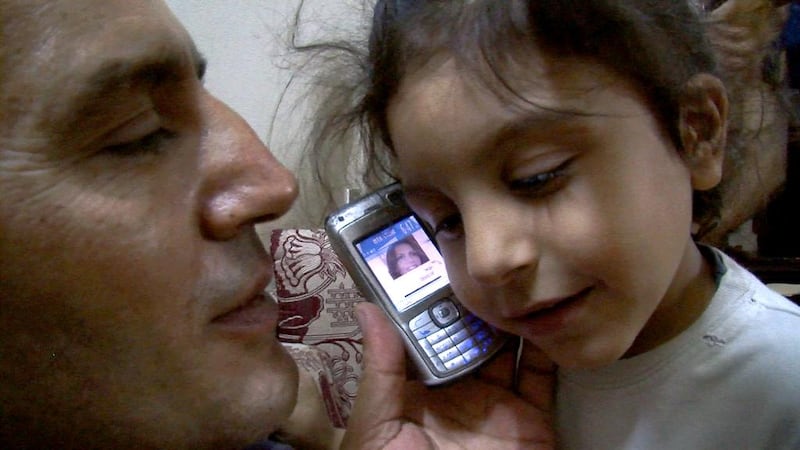In 2009, British filmmaker Sean McAllister planned to shoot a documentary about revolutionary stirrings in Syria, at a time before most his countrymen had heard of – or cared about – what was happening in Damascus.
But after six years of filming, what he ended up with was A Syrian Love Story, a candid record of the experiences of a couple and their children as the civil war erupted and they became refugees in Europe. The couple, Amer Daoud and Raghda Hassan, at first are very much in love but are slowly torn apart as they are haunted by memories from a homeland they can't forget.
By portraying the family’s very personal journey, McAllister humanises the newspaper headlines about the millions of anonymous Syrians trying to escape their war-torn country.
Speaking during a question-and-answer session after the first of two sold-out screenings at the Dubai International Film Festival, McAllister said that when he first visited Damascus – having shot documentaries during conflicts elsewhere in the region – it was a very different city, one which he thought of as “the hidden jewel of the Middle East”.
“People in Baghdad used to talk about this wonderful heyday that existed there in the 1980s,” he says. “When I got to Damascus, I thought, ‘I’m in this heyday here in Syria’ – the incredible restaurants, the vibe, the mix of all kinds of people.”
After eight months in the city, McAllister met Daoud, who had just taken a phone call from his left-wing activist wife. She was languishing in jail.
“Amer looked at me cynically after he heard I was a filmmaker and said, ‘You want to make a film about this country? Make a film about me’,” says McAllister.
“The windows of his world took me to the real Syria. The Damascus I’d been living in, like [Syrian president] Bashar Al Assad’s image, was a complete illusion. Scratching the surface, I found the prisons were more full than under [Mr Al Assad’s] father.”
McAllister’s film also shines a spotlight on the couple’s children, Shadi, Kaka and Bob. When their mother is released from prison, the family moves to Lebanon and then to relative safety and freedom in France.
But Hassan struggles to adapt to her new maternal role. Although reunited with her family, the emotional distance between her and Daoud grows.
McAllister admits he found himself becoming a “bad marriage counsellor” as well as filmmaker by becoming so close to the family.
“Statistically, divorce is extremely high among refugees”, he says. “Neither of them could really connect with each other and I found it very frustrating. They were just lost in their own kind of madness.”
While making the film, McAllister was arrested and jailed for a week in Syria. He was not tortured, but it was an experience he says he found "even more horrendous" than filming people being killed in Yemen – for his 2012 documentary The Reluctant Revolutionary.
“You hear grown men cry because they are being whipped and electrocuted by the same person who wants to come and befriend them the next day,” he says. “Psychologically, that plays on you – especially because the guys who were doing it had this fascination with talking to me afterwards about Princess Diana.
“You open your eyes to stuff that you don’t really want to think about.”
But the documentary also offered him some hope, especially for refugee children.
“I was really impressed by the resilience of kids,” he says. “I thought the children would be totally screwed up after all they’d been through. But as soon as they got to France, given that opportunity, those kids flew. It was the parents who were struggling – they became the kids, held in the cages of their minds.”
McAllister’s struggles while making the documentary didn’t stop at jail time. He funded the project himself for the first three years and had many moments when he considered giving up, especially as it became obvious that the couple’s love story was turning sour.
“This film is sort of my baby really,” he says. “But I’ve sacrificed all my other babies for this baby”.
So what drove him to see it through to its bitter end?
“When the news depicts a little boy’s body washed up on the seashore in a very tasteless way, as it was when this film was released, that footage only offers a 30-second sound bite or, if you’re lucky, a two-minute package about what a refugee family might have gone through,” he says. “Documentaries can assist in characterising news. I hope this film enables people to no longer look at that little boy in such an empty way anymore.”
• There are no more screenings of A Syrian Love Story at Diff. A general release has yet to be announced. You can watch it online on the British Film Institute website at player.bfi.org.uk for £6 (Dh33.5)
artslife@thenational.ae










